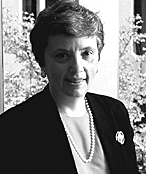You see it advertised everywhere--CHANGE--as if it were a new idea to which we are having to adapt for the very first time. We tend to get a heavy dose of it on campus this time of year as a new class of students arrives and new teachers join our faculty. There is a familiarity in the annual pattern of people leaving in May, arriving in August, but there is also a constant, subtle evolution occurring as students, administrators, and faculty alike bring new perspectives, skills, and ideas to this music community.
The classical music world sometimes is viewed as rather static and unchanging since achieving a certain maturity in the 19th century; yet we know that music always is undergoing its own process of evolution. The unusual aspect of the current evolution is not so much that music is becoming different, in this case much more diverse, but rather it is the pace at which change is occurring that has us looking at the idea with more than usual interest.
What I am observing is a rather beautiful expansion and continuity occurring, as the old is cherished and celebrated while at the same time evolving in new musical directions. Oberlin continues to excel at providing students with a solid foundation of music fundamentals, harmony and voice-leading, music theory, and the history of Western Music among other areas. I would be distressed if we lost sight of the rich heritage of the past in an attempt to create something bold and daring. But nearly all musicians of the 21st century (the current first-year students will graduate in 2002) will need to know more, and it is our job to insure that Oberlin imparts those other skills and ideas to meet the new musical landscape that is forming right before our eyes.
Let us consider this: we are about to welcome a new class for which computer competency and Internet knowledge are givens. The several computer labs in the Conservatory routinely are filled to capacity with students surfing the World Wide Web, writing e-mail and, yes, even working on research papers (we still do that here too!). Most students have their own computers in dorm rooms that are wired for direct access to Oberlin's network. We should not be surprised, then, that students and their teachers are also putting their technological skills to use in the study and creation of music.
The awareness of this phenomenon caused staff members to prepare a proposal last spring that has resulted in a grant from the Luce Foundation for a Chair in the Emerging Arts. And what, you might ask, are the "emerging arts?" To be completely honest, I am not sure any of us who helped secure this grant can provide a precise definition. What we do know is that new, multi-media art forms are being born. They stem from a convergence of many musical styles, cultures, and technology to form a fresh artistic language that has yet to mature and establish its own niche. The Luce Chair in the Emerging Arts will permit Oberlin students and faculty to be in the forefront of developing this language--one that is sure to reflect our time, and our artistic interpretation of it, in an integrated, culturally representative art form.
The changing music profession also presents challenges to our graduates in finding their way into that world. To help students make that connection, we have restructured the position of Associate Dean for Academic Affairs. I am particularly pleased to welcome Laura Kuennen-Poper to our staff as both Associate Dean and Director of Conservatory Career Development. Part of her job will be to coach students in the practical mechanics of finding their way in the professional music world once they leave Oberlin. A freelance musician and teacher in Los Angeles for many years, she has first-hand experience with the skills and perspective one needs, in addition to being a talented musician, to succeed in this brave new world.
Ms. Kuennen-Poper will be able to build upon one of the great strengths Oberlin embodies, something of which most of the freshmen now arriving are largely unaware. That is the resource they have in you, our alumni, incredibly talented and employed in every conceivable corner of the music world. We are interested in developing even further our collaborative relationship with you. Does your organization have a job opening which one of our students might fill, a summer or Winter Term internship opportunity? Could you return to campus more often to share what you have learned "in the real world" with students so that they may continue Oberlin's tradition of excellence after graduation? I firmly believe that collaboration in music, between performer and composer (if they aren't already one and the same), between musician and visual artist, between education and "the industry," between the alma mater and its alumni, is the way of the future. It is what will continue to make this art form so engaging and enriching to our lives. I look forward to your participation in this enterprise.

Karen L. Wolff
Dean of the Conservatory
- Back to the Conservatory News table of contents